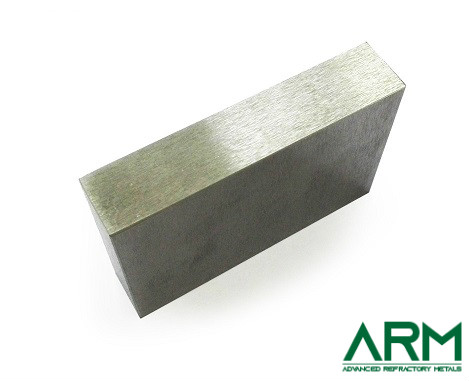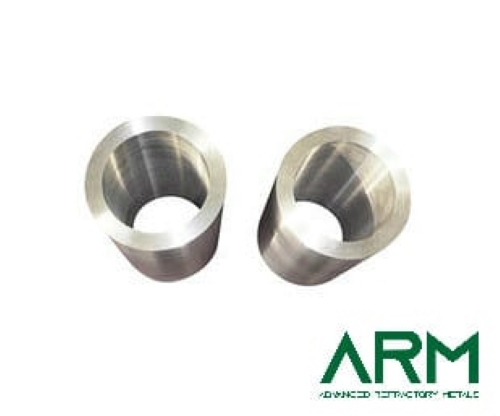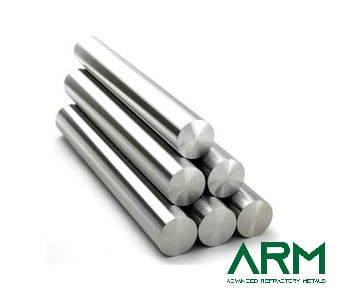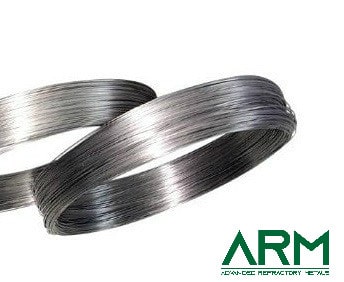Advanced Refractory Metals (ARM) offers premium-grade Tungsten Alloys engineered for exceptional strength, density, and thermal stability. Our tungsten-based materials are ideal for aerospace, medical, and industrial applications that require durability in extreme conditions. Available in rods, plates, wires, and custom machined components.

Tungsten Alloy Description
Tungsten Alloys are high-density metal materials composed primarily of tungsten combined with elements like nickel, iron, copper, or rhenium. They offer exceptional strength, thermal stability, and radiation shielding, making them ideal for aerospace, medical, and industrial applications.
Product List
|
Product Code |
Product Name |
Description |
Typical Forms |
|
Tungsten Nickel Iron Alloy |
High-density alloy with excellent strength and machinability; ideal for aerospace, and tooling. |
Rods, Plates, Custom Machined Parts |
|
|
Tungsten Nickel Copper Alloy |
Non-magnetic tungsten alloy with high corrosion resistance; widely used in medical and electronic shielding. |
Blocks, Cylinders, Precision Components |
|
|
Tungsten Alloy Counterweight Parts |
Precision counterweights for aerospace, automotive, and industrial balancing applications. |
Custom Shapes, Finished Components |
|
|
Tungsten Alloy Crankshaft Weight |
Engineered for high-performance engines; enhances stability and rotational balance. |
Machined Inserts, Custom Balancers |
|
|
Tungsten Rhenium Alloy Wire |
High-temperature wire with excellent thermal and electrical conductivity; suitable for thermocouples and heating elements. |
Wire Coils, Spools |
|
|
Tungsten Rhenium Alloy Thermocouple |
Designed for precise temperature measurement in extreme environments; highly stable and reliable. |
Wire, Thermocouple Assemblies |
Custom alloys and machining services available upon request.
Tungsten Alloy Applications
Tungsten Alloys are used across multiple industries where extreme density, strength, and heat resistance are critical:
- Aerospace: Balance weights, control surfaces, vibration dampers
- Medical: Cancer therapy collimators, shielding for X-ray and gamma-ray
- Industrial: Electrodes, heat spreaders, die-casting molds
- Electronics: Thermal management components, EMI shielding
- Sports & Automotive: Racing weights, flywheels, crankshaft balancing
FAQs
Q1: What is the difference between W-Ni-Fe and W-Ni-Cu tungsten alloys?
A: W-Ni-Fe offers higher mechanical strength and magnetic properties, making it suitable for structural components. W-Ni-Cu is non-magnetic and preferred for medical and electronic shielding.
Q2: What is the typical density of tungsten alloys?
A: Depending on the composition, tungsten alloys typically range from 17.0 to 18.5 g/cm³, which is about 1.7 times the density of lead.
Q3: Can ARM provide custom shapes and machined parts?
A: Yes, ARM offers precision machining and custom fabrication services based on your specifications and drawings.
Q4: Are these tungsten alloys safe to use for radiation shielding?
A: Absolutely. Tungsten alloys are non-toxic and environmentally safer than lead, offering excellent gamma and X-ray attenuation properties.
Q5: What’s the lead time for tungsten alloy products?
A: Standard sizes are usually in stock and ship within 3–5 business days. Custom orders may take 2–4 weeks depending on complexity.
Request a Quote
Need a custom solution or unsure which tungsten alloy fits your application? Contact ARM today to speak with our materials experts or request a detailed quote.
- Your Name (required)
- Your Email (required)
- Company Name (required)
-
Country (required)
United States
- United States
- Afghanistan
- Aland Islands
- Albania
- Algeria
- American Samoa
- Andorra
- Angola
- Anguilla
- Antarctica
- Antigua and Barbuda
- Argentina
- Armenia
- Aruba
- Australia
- Austria
- Azerbaijan
- Bahamas
- Bahrain
- Bangladesh
- Barbados
- Belarus
- Belgium
- Belize
- Benin
- Bermuda
- Bhutan
- Bolivia
- Bosnia and Herzegovina
- Botswana
- Bouvet Island
- Brazil
- British Indian Ocean Territory
- British Virgin Islands
- Brunei
- Bulgaria
- Burkina Faso
- Burundi
- Cambodia
- Cameroon
- Canada
- Cape Verde
- Cayman Islands
- Central African Republic
- Chad
- Chile
- China
- Christmas Island
- Cocos (Keeling) Islands
- Colombia
- Comoros
- Congo
- Cook Islands
- Costa Rica
- Croatia
- Cuba
- Cyprus
- Czech Republic
- Democratic Republic of Congo
- Denmark
- Disputed Territory
- Djibouti
- Dominica
- Dominican Republic
- East Timor
- Ecuador
- Egypt
- El Salvador
- Equatorial Guinea
- Eritrea
- Estonia
- Ethiopia
- Falkland Islands
- Faroe Islands
- Federated States of Micronesia
- Fiji
- Finland
- France
- French Guyana
- French Polynesia
- French Southern Territories
- Gabon
- Gambia
- Georgia
- Germany
- Ghana
- Gibraltar
- Greece
- Greenland
- Grenada
- Guadeloupe
- Guam
- Guatemala
- Guinea
- Guinea-Bissau
- Guyana
- Haiti
- Heard Island and Mcdonald Islands
- Honduras
- Hong Kong
- Hungary
- Iceland
- India
- Indonesia
- Iran
- Iraq
- Iraq-Saudi Arabia Neutral Zone
- Ireland
- Israel
- Italy
- Ivory Coast
- Jamaica
- Japan
- Jordan
- Kazakhstan
- Kenya
- Kiribati
- Kuwait
- Kyrgyzstan
- Laos
- Latvia
- Lebanon
- Lesotho
- Liberia
- Libya
- Liechtenstein
- Lithuania
- Luxembourg
- Macau
- Macedonia
- Madagascar
- Malawi
- Malaysia
- Maldives
- Mali
- Malta
- Marshall Islands
- Martinique
- Mauritania
- Mauritius
- Mayotte
- Mexico
- Moldova
- Monaco
- Mongolia
- Montenegro
- Montserrat
- Morocco
- Mozambique
- Myanmar
- Namibia
- Nauru
- Nepal
- Netherlands Antilles
- Netherlands
- New Caledonia
- New Zealand
- Nicaragua
- Niger
- Nigeria
- Niue
- Norfolk Island
- North Korea
- Northern Mariana Islands
- Norway
- Oman
- Pakistan
- Palau
- Palestinian Territories
- Panama
- Papua New Guinea
- Paraguay
- Peru
- Philippines
- Pitcairn Islands
- Poland
- Portugal
- Puerto Rico
- Qatar
- Reunion
- Romania
- Russia
- Rwanda
- Saint Helena and Dependencies
- Saint Kitts and Nevis
- Saint Lucia
- Saint Pierre and Miquelon
- Saint Vincent and the Grenadines
- Samoa
- San Marino
- Sao Tome and Principe
- Saudi Arabia
- Senegal
- Serbia
- Seychelles
- Sierra Leone
- Singapore
- Slovakia
- Slovenia
- Solomon Islands
- Somalia
- South Africa
- South Georgia and South Sandwich Islands
- South Korea
- Spain
- Spratly Islands
- Sri Lanka
- Sudan
- Suriname
- Svalbard and Jan Mayen
- Swaziland
- Sweden
- Switzerland
- Syria
- Taiwan
- Tajikistan
- Tanzania
- Thailand
- Togo
- Tokelau
- Tonga
- Trinidad and Tobago
- Tunisia
- Turkey
- Turkmenistan
- Turks And Caicos Islands
- Tuvalu
- US Virgin Islands
- Uganda
- Ukraine
- United Arab Emirates
- United Kingdom
- United States
- United States Minor Outlying Islands
- Uruguay
- Uzbekistan
- Vanuatu
- Vatican City
- Venezuela
- Vietnam
- Wallis and Futuna
- Western Sahara
- Yemen
- Zambia
- Zimbabwe
- Your Phone (Optional)
-
Metals (Optional)
Tantalum...
-
I would like to join the mailing list to receive updates from Advanced Refractory Metals.
- Notes (required)
-
Attachment (Optional)
No file chosen
-
- Your Name (required)
- Your Email (required)
- Company Name (required)
-
Country (required)
United States
- United States
- Afghanistan
- Aland Islands
- Albania
- Algeria
- American Samoa
- Andorra
- Angola
- Anguilla
- Antarctica
- Antigua and Barbuda
- Argentina
- Armenia
- Aruba
- Australia
- Austria
- Azerbaijan
- Bahamas
- Bahrain
- Bangladesh
- Barbados
- Belarus
- Belgium
- Belize
- Benin
- Bermuda
- Bhutan
- Bolivia
- Bosnia and Herzegovina
- Botswana
- Bouvet Island
- Brazil
- British Indian Ocean Territory
- British Virgin Islands
- Brunei
- Bulgaria
- Burkina Faso
- Burundi
- Cambodia
- Cameroon
- Canada
- Cape Verde
- Cayman Islands
- Central African Republic
- Chad
- Chile
- China
- Christmas Island
- Cocos (Keeling) Islands
- Colombia
- Comoros
- Congo
- Cook Islands
- Costa Rica
- Croatia
- Cuba
- Cyprus
- Czech Republic
- Democratic Republic of Congo
- Denmark
- Disputed Territory
- Djibouti
- Dominica
- Dominican Republic
- East Timor
- Ecuador
- Egypt
- El Salvador
- Equatorial Guinea
- Eritrea
- Estonia
- Ethiopia
- Falkland Islands
- Faroe Islands
- Federated States of Micronesia
- Fiji
- Finland
- France
- French Guyana
- French Polynesia
- French Southern Territories
- Gabon
- Gambia
- Georgia
- Germany
- Ghana
- Gibraltar
- Greece
- Greenland
- Grenada
- Guadeloupe
- Guam
- Guatemala
- Guinea
- Guinea-Bissau
- Guyana
- Haiti
- Heard Island and Mcdonald Islands
- Honduras
- Hong Kong
- Hungary
- Iceland
- India
- Indonesia
- Iran
- Iraq
- Iraq-Saudi Arabia Neutral Zone
- Ireland
- Israel
- Italy
- Ivory Coast
- Jamaica
- Japan
- Jordan
- Kazakhstan
- Kenya
- Kiribati
- Kuwait
- Kyrgyzstan
- Laos
- Latvia
- Lebanon
- Lesotho
- Liberia
- Libya
- Liechtenstein
- Lithuania
- Luxembourg
- Macau
- Macedonia
- Madagascar
- Malawi
- Malaysia
- Maldives
- Mali
- Malta
- Marshall Islands
- Martinique
- Mauritania
- Mauritius
- Mayotte
- Mexico
- Moldova
- Monaco
- Mongolia
- Montenegro
- Montserrat
- Morocco
- Mozambique
- Myanmar
- Namibia
- Nauru
- Nepal
- Netherlands Antilles
- Netherlands
- New Caledonia
- New Zealand
- Nicaragua
- Niger
- Nigeria
- Niue
- Norfolk Island
- North Korea
- Northern Mariana Islands
- Norway
- Oman
- Pakistan
- Palau
- Palestinian Territories
- Panama
- Papua New Guinea
- Paraguay
- Peru
- Philippines
- Pitcairn Islands
- Poland
- Portugal
- Puerto Rico
- Qatar
- Reunion
- Romania
- Russia
- Rwanda
- Saint Helena and Dependencies
- Saint Kitts and Nevis
- Saint Lucia
- Saint Pierre and Miquelon
- Saint Vincent and the Grenadines
- Samoa
- San Marino
- Sao Tome and Principe
- Saudi Arabia
- Senegal
- Serbia
- Seychelles
- Sierra Leone
- Singapore
- Slovakia
- Slovenia
- Solomon Islands
- Somalia
- South Africa
- South Georgia and South Sandwich Islands
- South Korea
- Spain
- Spratly Islands
- Sri Lanka
- Sudan
- Suriname
- Svalbard and Jan Mayen
- Swaziland
- Sweden
- Switzerland
- Syria
- Taiwan
- Tajikistan
- Tanzania
- Thailand
- Togo
- Tokelau
- Tonga
- Trinidad and Tobago
- Tunisia
- Turkey
- Turkmenistan
- Turks And Caicos Islands
- Tuvalu
- US Virgin Islands
- Uganda
- Ukraine
- United Arab Emirates
- United Kingdom
- United States
- United States Minor Outlying Islands
- Uruguay
- Uzbekistan
- Vanuatu
- Vatican City
- Venezuela
- Vietnam
- Wallis and Futuna
- Western Sahara
- Yemen
- Zambia
- Zimbabwe
- Your Phone (Optional)
-
Metals (Optional)
Tantalum...
- Notes (required)
-
Attachment (Optional)
No file chosen
-















